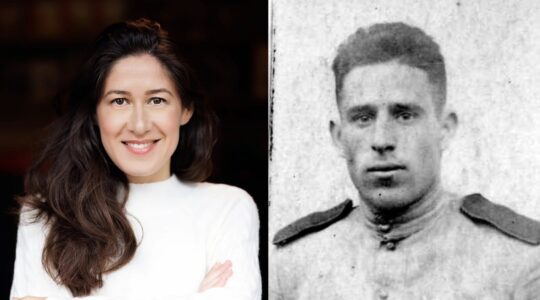Despite what you may have heard, American Jews are sticking with the Democrats, and the party’s perceived support — or lack thereof — of Israel won’t change that.
“American Jews have, as the evidence suggests, a strong emotional attachment to Israel,” according to Kenneth Wald, a professor of political science at the University of Florida and the former director of the school’s Center for Jewish Studies. “But it’s more important to note they don’t translate this into overt political action.”
Wald, a preeminent scholar on the voting habits of American Jews, was one of three political experts to engage in a panel discussion, “The Puzzling Politics of American Jewry: Why Do Jews Vote the Way They Do?” at the fifth annual Jewish University for a Day program, sponsored jointly by the Stony Brook University Hillel and the Jewish Theological Seminary. Joining Wald — who participated via satellite due to illness — was Lawrence Levy, the executive dean of the National Center for Suburban Studies at Hofstra University and the former chief political columnist for Newsday; Michael Dawidziak, a longtime political consultant and polling expert for numerous candidates, including George H.W. Bush, working on his 1988 and 1992 campaigns; and moderator James Klurfeld, a visiting professor of journalism at Stony Brook University.
Even with the American Jewish Committee’s 2015 Survey of American Jews showing a slight move to the right on the political spectrum since the AJC’s previous survey in 2013 — Jews identifying as Democrats fell 3.5 percent, Republicans rose 4 percent — their votes have been consistent for decades. Noting that since the 1940s Jews have been 20 to 30 percent more Democratic than the rest of the American public, Wald called Jewish voters “deviant,” as they so often vote against what might be considered their best interests.
“What is striking about American Jews is how different they are, not just from American voters in general, but from those American voters who they resemble in socioeconomic terms,” he said.
The reason for this, he theorized, is that when Jews first arrived in the U.S. in the 18th century they were amazed to find a political system that, at least on the national level, did not discriminate based on religion or ethnicity. Since then, American Jews have been determined to protect that system and oppose candidates and parties they believe threaten the separation of church and state.
“I think that’s why Jews turned back to the Democratic Party in the 1980s precisely as the evangelical Protestants, the movement known as the Christian Right, became a significant force and then the base of the Republican Party,” he said.
During the question-and-answer portion of the program, an audience member expressed concern that assimilation and other factors are causing younger voters to identify less as Jews and, as a result, shifting toward the political right. Dawidziak questioned whether this was true.
“I certainly know, anecdotally, many friends on Long Island who are my age — meaning older — who are that typical, liberal-Democratic-social justice type of Jewish voters, and their children are turning into Alex Keaton,” he said, referencing the ultra-conservative son of hippies on the 1980s sitcom, “Family Ties.” However, “I don’t have any data to back up that that’s a real trend.”
Jews make up just a tiny slice of the American electorate — just 2.2 percent of the U.S. population, 61 percent of whom live in four states, New York, New Jersey, California and Florida, according to a 2013 survey by the Pew Research Center. But despite the small numbers, panelists argued against the popular belief that the Jewish vote doesn’t matter.
“Even a presence of 2 percent of the voting population that tends to vote in much higher proportions than many can play a very significant role,” said Levy. He suggested that in a close national election, the Jewish vote could make the difference in what he termed “The Trinity” of swing states: Ohio, Florida and Pennsylvania.
The panelists agreed that the Jewish vote has significant relevance to local elections, especially in New York. Levy said that Jews have become politically active in the Five Towns, where a growing divide has emerged between members of the Reform and Conservative movements, who generally lean toward liberal candidates, and Orthodox Jews, who are increasingly voting for Republicans.
Levy cited the upcoming special election between Democratic Assemblyman Todd Kaminsky and Republican candidate Chris McGrath, to fill the seat of the disgraced former majority leader of the New York State Senate, Republican Dean Skelos. As the 62 filled seats are split evenly between the two parties, the dead-heat election will determine if the Republican Party has any say in state politics.
“Democrats will control all the houses and the governorship, so this is considered a very, very important election, and Jews are the main focus of both parties,” Levy said. “The Republicans are going after the Orthodox community and the Democrats are trying to get out the vote among [Conservative and Reform] voters.
“In the end, Jews are going to decide.”
Another reason to court the Jews: They always vote.
“Only about 10 percent of the registered voters in Suffolk County are Jewish, but they turn out at least double than their non-Jewish counterparts,” said Dawidziak. “So it’s probably more like 20 percent of the vote, and when you get to about 20 percent of the vote, you’re talking about a lot of clout.”
Perhaps most surprising was that, just 10 days before the New York State primary, two words were not uttered even once during the hour-and-a-half-long discussion: Donald Trump.
“There’s really nothing to say. He’s got a 72 percent disapproval rating among Jews,” Dawidziak said after the program ended. “Then again, he has a 24 percent approval rating among Jews, so there is a percentage.”
Levy reasoned that Jews may be turned off by the real estate mogul, in addition to several other factors, because of their inherent fear of the mob.
“They see Trump as someone who perhaps is rousing up anger, and that can never be good for the Jews. It never is in any country; it never is in any time.”
It all adds up to maintaining the status quo.
“I suspect this is the first year since I’ve been writing about Jewish political behavior when nobody will tell me confidently that this is the election when Republicans will break through to Jewish voters,” Wald wrote later over email. “Too bad — it’s been the one constant in my life.”
The New York Jewish Week brings you the stories behind the headlines, keeping you connected to Jewish life in New York. Help sustain the reporting you trust by donating today.




